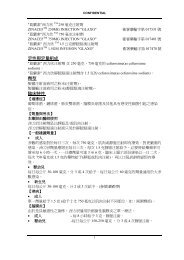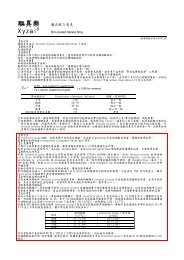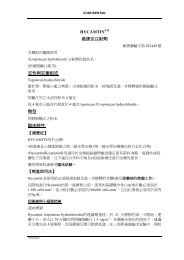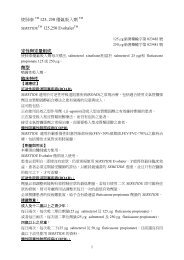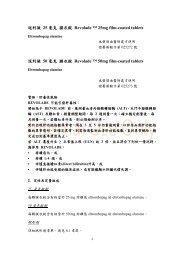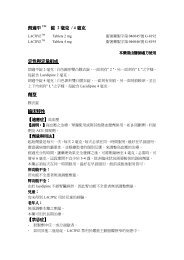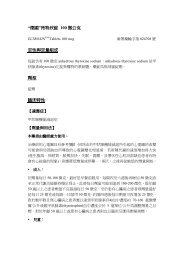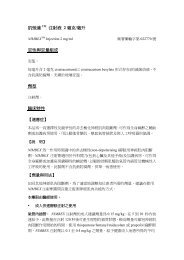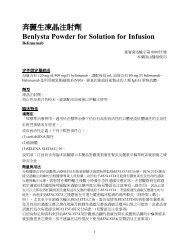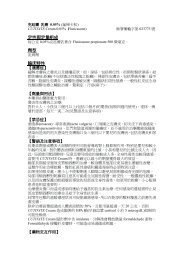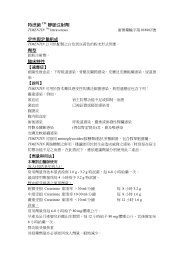RELENZA(瑞樂沙)全仿單 - 荷商葛蘭素史克
RELENZA(瑞樂沙)全仿單 - 荷商葛蘭素史克
RELENZA(瑞樂沙)全仿單 - 荷商葛蘭素史克
You also want an ePaper? Increase the reach of your titles
YUMPU automatically turns print PDFs into web optimized ePapers that Google loves.
CONFIDENTIAL<br />
Prophylaxis<br />
The recommended dose of RELENZA is two inhalations (2 x 5 mg) once daily for 10<br />
days, providing a total daily inhaled dose of 10mg. This may be increased up to one<br />
month if the period of exposure risk extends beyond 10 days.<br />
The full course of prophylaxis therapy should be completed as prescribed.<br />
• Children<br />
No dose modification is required (see Pharmacokinetics).<br />
• Elderly<br />
No dose modification is required (see Pharmacokinetics).<br />
• Renal impairment<br />
No dose modification is required (see Pharmacokinetics).<br />
• Hepatic impairment<br />
No dose modification is required (see Pharmacokinetics).<br />
Contraindications<br />
Hypersensitivity to any ingredient of the preparation (see Pharmaceutical Particulars –<br />
List of Excipients).<br />
Warnings and Precautions<br />
Influenza infection can be associated with increased airways hyper-responsiveness. There<br />
have been very rare reports of patients being treated for influenza who have experienced<br />
bronchospasm and/or decline in respiratory function after the use of RELENZA, some of<br />
whom did not have any previous history of respiratory disease. Any such patients should<br />
discontinue RELENZA and seek medical evaluation. Patients with underlying respiratory<br />
disease should have a fast acting bronchodilator available when taking RELENZA (see<br />
Dosage and Administration).<br />
Allergic-like reactions, including oropharyngeal edema, serious skin rashes have been<br />
reported in postmarketing experience with RELENZA. RELENZA should be stopped and<br />
appropriate treatment instituted if an allergic reaction occurs or is suspected.<br />
Influenza can be associated with a variety of neurological and behavioural symptoms.<br />
There have been postmarketing reports (mostly from Japan and in paediatric subjects) of<br />
seizures, delirium, hallucination and abnormal behaviour in patients with influenza who<br />
were receiving neuraminidase inhibitors, including RELENZA. The events were observed<br />
mainly early in the illness and often had an abrupt onset and rapid resolution. The



